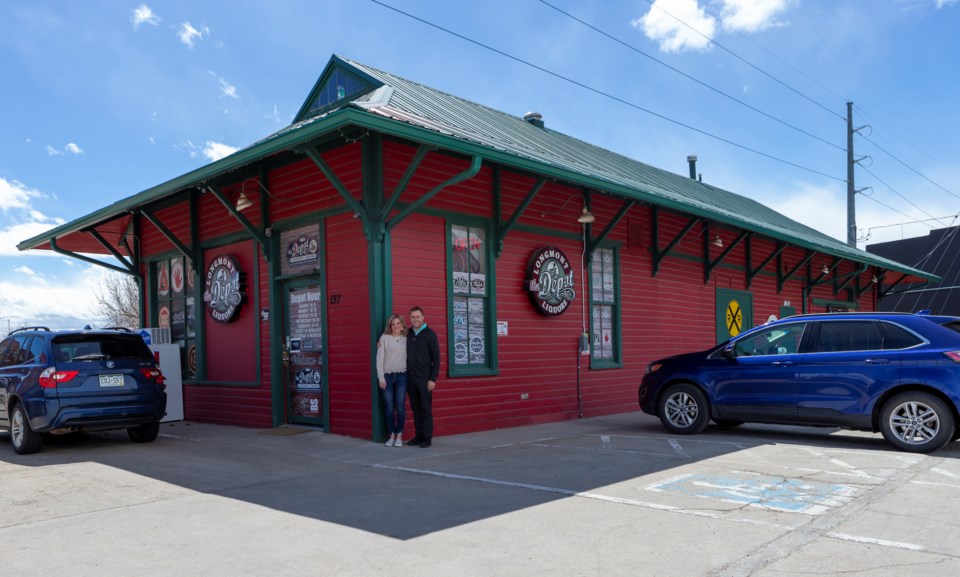Three questions on the ballot could have serious consequences for local liquor stores, according to at least two Longmont business owners.
Chris McGilvray and his wife have owned Longmont Liquors on Main Street for over a decade, while Mat Ginsmore owns Wyatt’s Wet Goods. Both are staunchly opposed to Propositions 124, 125 and 126, which they say would negatively affect them and other independent liquor store owners in Longmont.
Several grocery stores in Longmont have signs posted outside their doors encouraging shoppers to support the propositions, and major companies like DoorDash, Instacart, Target, Albertsons Safeway and Kroger have spent millions of dollars supporting the measures.
Proponents highlight convenience as a reason to support the propositions, which could alter how independent liquor stores operate and make money.
Proposition 124 seeks to increase the number of allowable liquor store locations that one entity could own. Currently, liquor stores are limited to three locations per licensee.
Under this measure, retail liquor stores would be allowed to apply for the same number of locations as liquor-licensed drugstores. While proponents of the proposition say that the measure brings parity to retail liquor stores, McGilvray doesn’t see it benefiting his business.
“What this is going to do is allow for national chains to move to Colorado and open additional licenses,” he said. “It’s really giving leverage to the national chains.”
For Ginsmore, there’s no need to have additional licenses available for most store owners because franchising is too expensive for a family owned business.
“Quite frankly, to go out and open a new Wyatt’s is millions and millions of dollars,” he said. “Not many people in Colorado have the resources to scale up the way a chain that does business in 30 states and does $10 billion a year in sales can.”
Proposition 125, if passed, allows grocery and convenience stores that already sell beer to also sell wine beginning in March. The measure brings up familiar concerns for liquor store owners when retailers were allowed to begin selling beer.
“When we allowed the sale of beer in grocery stores and convenience stores, that significantly impacted our small independent liquor stores in a big way because small independent retailers can’t compete at scale against these national chains,” McGilvray said.
Ginsmore pointed to the over 1,600 independent liquor stores in the state that give consumers plenty of options to buy wine in the liquor ecosystem the state created.
“Colorado evolved and gave mom and pops not only a chance to build a business, but to thrive,” he said. “Quite frankly, if Walmart doesn’t get wine, Walmart’s going to be just fine. Now, if Walmart gets wine and bankrupts a thousand families, maybe they can go buy a football team that’ll win.”
As for Proposition 126, which would allow for the third-party delivery of alcohol beverages for both restaurants and liquor stores, McGilvray sees it disproportionately benefitting the large chains over small liquor stores due to their scale.
“The delivery of alcohol and beer makes it more challenging for your independent small liquor stores to compete,” he said.
Proponents cited the convenience of alcohol deliveries, especially during the pandemic, as the main reason to support this measure.
Wyatt’s already delivers alcohol to the Longmont area, which any liquor store can currently do with their own employees if they so desire. Ginsmore added that while he’s not opposed to restaurants being able to deliver alcohol, there are safety issues that arise when third parties are delivering much larger quantities from liquor stores.
“When you add in a gig worker, these third party delivery folks don’t have a liquor license,” Ginsmore said. “They have no skin in the game, yet, at a certain point, who’s to blame when something goes wrong?”
Both liquor store owners saw the three measures as antithetical to their small businesses.
“It’s unfortunate to see this even get to this point because this is not what Colorado stands for,” McGilvray said. “We value small business — 80% of our jobs in Colorado come from small businesses.”
Ginsmore hoped that the people who rallied behind supporting small businesses during the pandemic do so with their votes on these measures as well.
“If you want to support Amazon Whole Foods, DoorDash, Grubhub, vote yes,” he said. “If you want to support the guy who’s out there for the Girl Scout bake sale, the hospital foundation donation thing or your kid’s baseball team, vote no. It’s very simple to put your vote where your mouth is.”



